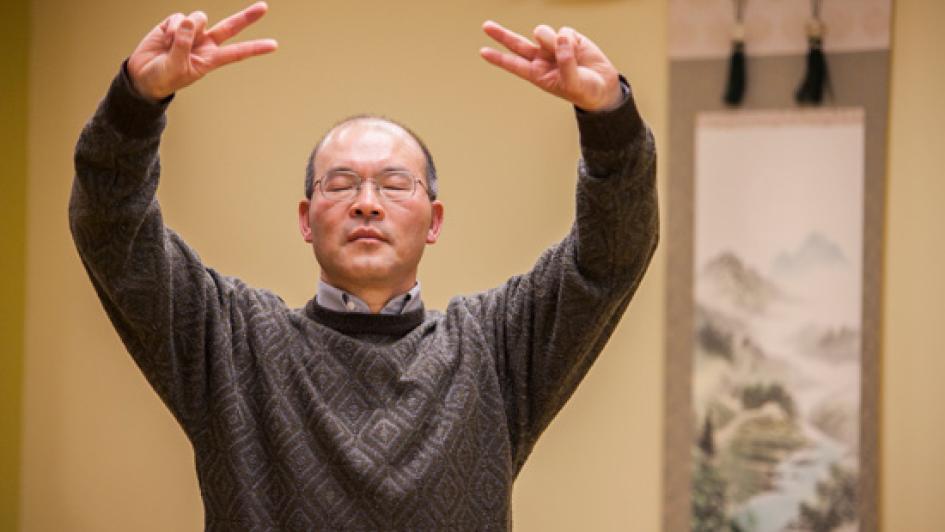Qigong May Help Diabetes Patients Lose Weight, Study Finds

Published
Qigong, an ancient Chinese practice of slow movements and rhythmic breathing, has flourished for thousands of years as a wellness therapy believed to strengthen the body's immune system.
It may also be an effective weight-loss therapy for type 2 diabetes patients, according to a new paper from researchers at Bastyr University and the University of Washington.
The team found that patients who practiced a specific form of qigong lowered their weight and insulin resistance, a contributing factor for type 2 diabetes. Qigong practitioners outperformed a control group and a group that performed alternate exercises in the randomized controlled study. The peer-reviewed Journal of Integrative Medicine & Therapy recently published the results.
"The exciting part is that no one has ever reported that qigong can help with losing weight," says lead investigator Guan-Cheng Sun, PhD.
The paper is the third publication to come from qigong diabetes research at the Bastyr University Research Institute. Previous reports found that qigong improved blood-glucose control and stress and depression rates in diabetes patients.
Dr. Sun developed a distinct therapy, Yi Ren Medical Qigong, through decades of work as a healing practitioner. He first learned the practice from his grand-uncle, who used it to cure him of digestive troubles as a child in rural China (read Dr. Sun's fascinating backstory). Like all traditional Chinese medicine, Dr. Sun's therapy rests on the notion of qi (pronounced "chee"), a person's essential life force. Gong means the discipline of cultivating qi. Qigong and tai chi — terms sometimes used interchangeably — both promote the healthful flow of qi through the body.
In the study, 32 participants were randomly assigned to three groups. The qigong group performed one 30-minute session with a certified Yi Ren Qigong instructor and two more at home each week. The progressive resistance training (PRT) group performed similar physical movements, using elastic exercise bands instead of qigong's focused meditation and breathing. A control group performed neither exercise.
After 12 weeks, the qigong and PRT groups both demonstrated statistically significant weight loss (see the full results). Obesity is a contributing factor for diabetes, and the American Medical Association last year classified obesity as a disease. The qigong group also lowered its rate of insulin resistance, which develops when cells do not respond properly to insulin and cannot easily absorb glucose from the bloodstream.
Because insulin resistance often leads to diabetes, avoiding it is even more significant than weight loss, Dr. Sun says.
"In the beginning of the study, we did not expect that people would heal this completely," he says. "This caught our attention."
Qigong therapies could be far less expensive than conventional diabetes care, with fewer side effects. The study's regimen of three 30-minute sessions a week is "very doable" for most patients, Dr. Sun says.
He worked with Andrew Zhou, PhD, a biostatistician at the University of Washington School of Public Health and professor in the UW Department of Biostatistics, to conduct the most recent analysis on the data.
The trial's small sample size means it functions as a "proof of concept," not a definitive study. Funding for the initial study came from the National Center for Complementary and Alternative Medicine, part of the National Institutes of Health. It will take new funding to let the group expand its research.
For now, the study suggests it's possible to use empirical scientific methods to measure energy-based traditional medicines. A biological mechanism explaining qi has never been discovered, a problem for conventional scientists who want to understand phenomena at the molecular level. That's prompted some researchers to focus on measuring patient outcomes — such as improved health for diabetes patients.
Other Bastyr studies have measured patient outcomes to find that naturopathic medicine can lower rates of heart disease and that integrative cancer care may extend the lives of patients with advanced cancers.
If rigorously designed clinical trials can show that traditional medicines improve patients' lives, that may be what matters most.
"Even though we don't understand the biological process of how qigong works, we have patient outcomes, and they are scientifically accepted patient outcomes," says Dr. Zhou. "If we can design a randomized clinical trial with a large sample size and show that qigong works, people will listen."
Dr. Sun, who teaches qigong self-care classes for the public, earned a doctorate in molecular genetics and has contributed to Bastyr research measuring qigong's effect on the brain using functional magnetic resonance imaging (fMRI). He says the diabetes study strengthens his interest in understanding scientifically how the 4,000-year-old practice works.
"At this point we can see that qigong is working differently than regular exercise," he says. "But how does it work differently? We need to do studies to find how it's working at the molecular level. That would be a great contribution to diabetes care."

